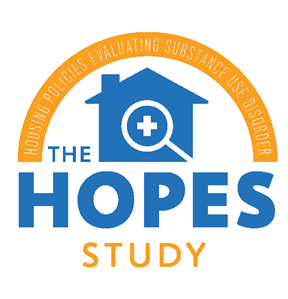HOusing Policies Evaluating Substance use disorder Study
Exploring the impact of housing policies on engagement in substance use treatment and overdose risk during the COVID-19 pandemic.
Background: Substance use disorder (SUD), overdose risk, and housing insecurity have skyrocketed in the US. In 2019, over 8 million individuals met criteria for SUD, and nearly 37 million households were spending more than 30% of their income on housing. Beyond initiatives focused on people without housing such as housing first, there has been a paucity of research focusing on the intersection of SUD and housing insecurity. Even less is known about whether policy attempts designed to support housing security have the potential to improve engagement in substance use treatment and reduce fatal and non-fatal overdose. Innovative housing policies—including eviction moratoriums, emergency rental assistance, and legal representation to tenants facing eviction (right to counsel)—offer an unprecedented opportunity to fill this vital knowledge gap. Widespread variation across states in whether and how these policies were implemented allow them to be rigorously studied using causal methods with mechanisms and potential mechanisms explored using qualitative approaches.

Approach: This study uses a difference-in-differences approach to examine the effects of the three housing policies of interest on rates of substance use treatment and fatal and non-fatal drug overdose. Data sources include a detailed policy mapping together with IQVIA, HCUP, and CDC data.
In-depth qualitative interviews were also performed with people with recent histories of drug use and housing insecurity, as well as with providers and policy officials in selected urban and rural counties.
Team: The study team is led by Craig Pollack and Matthew Eisenberg and includes Sabriya Linton, Kathryn Leifheit, Alene Kennedy-Hendricks, Yimin Ge, Leah Robinson, Iraj Qureshi, Laken Roberts, Michael Fingerhood, Hridika Shah, and Minna Song.
Funding: This project was funded by a grant from the National Institute of Nursing Research (R01NR020854).
